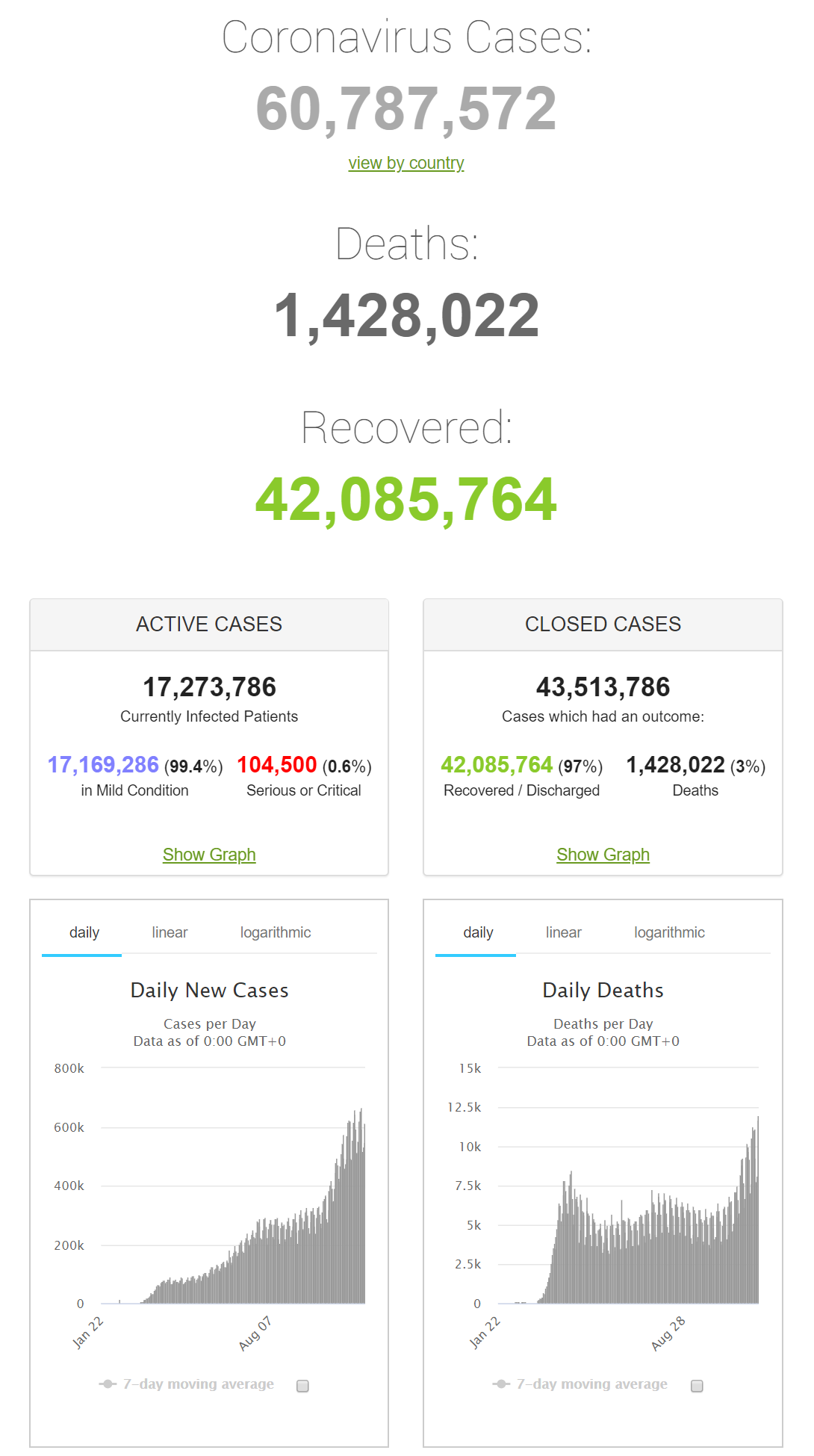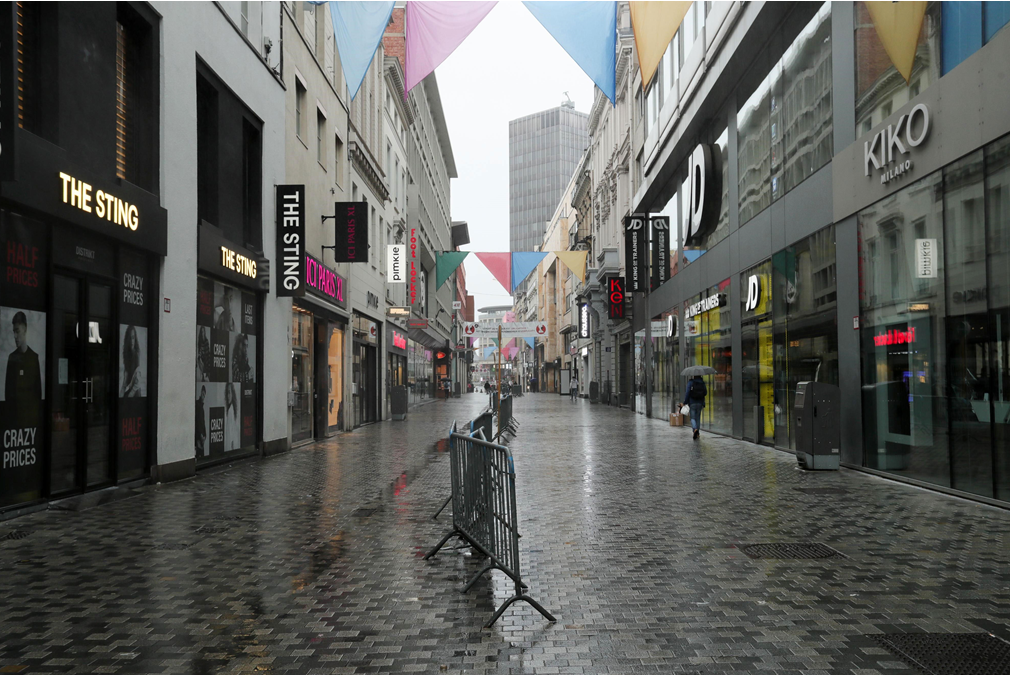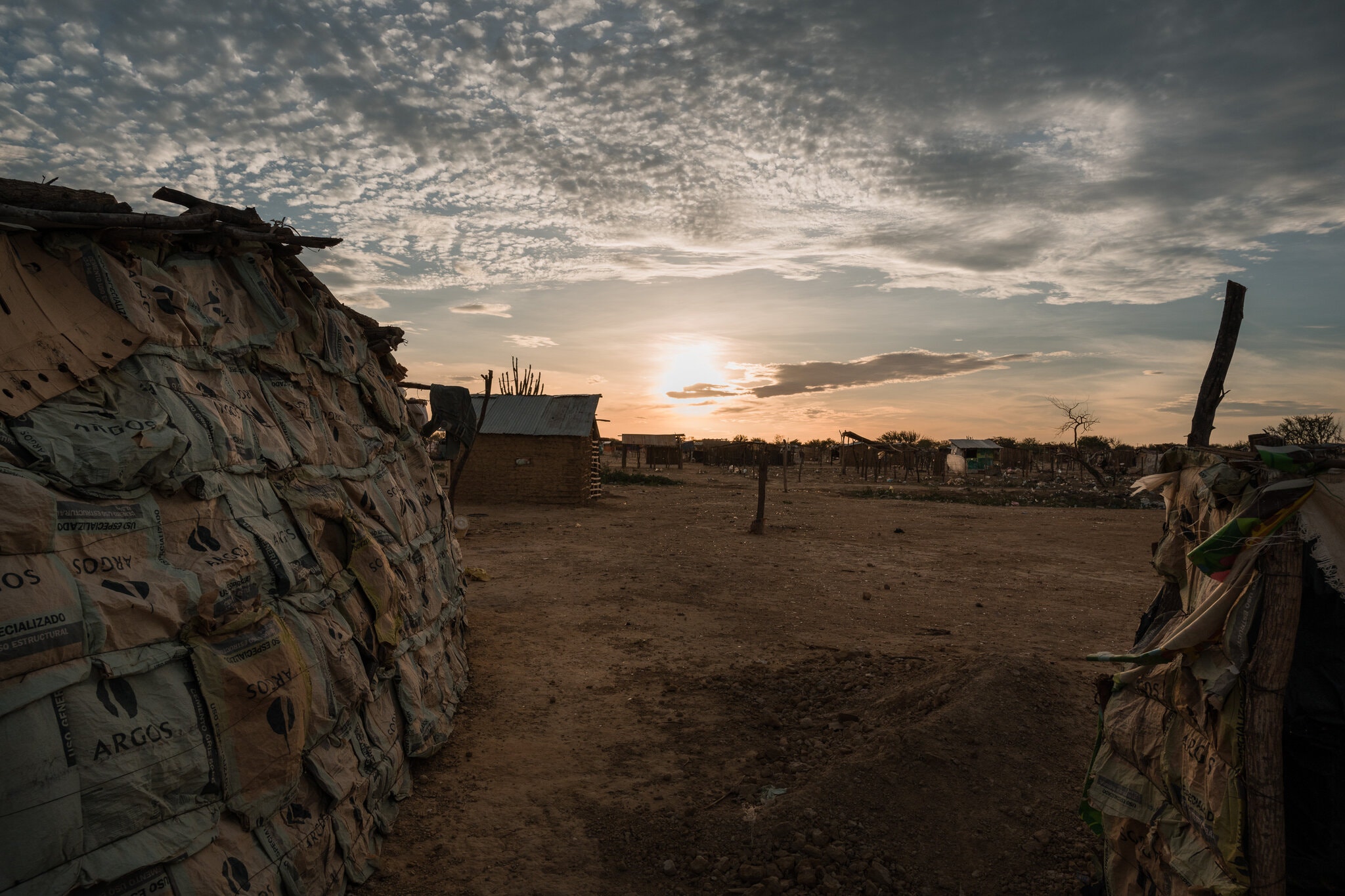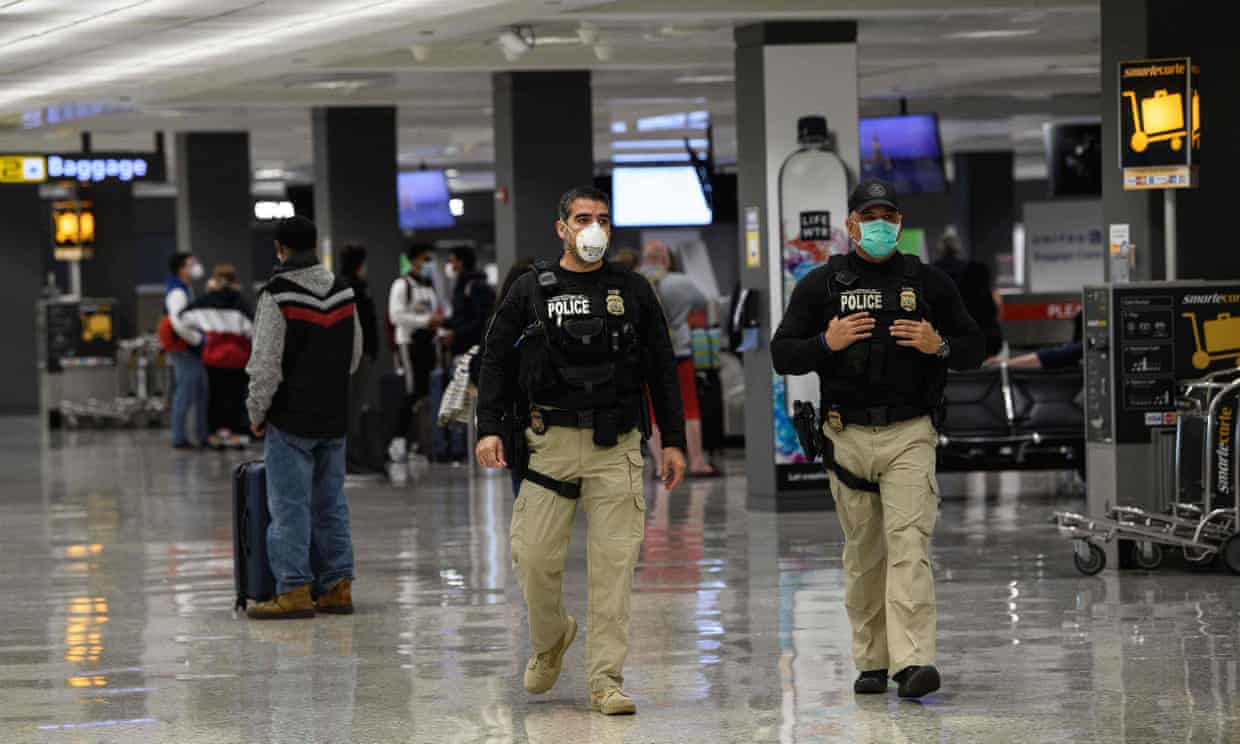
 i_need_contribute
i_need_contribute


|
Country, |
Total |
New |
Total |
|
World |
60,704,884 |
+609,418 |
1,425,916 |
|
13,138,204 |
+181,124 |
268,221 |
|
|
9,266,697 |
+44,699 |
135,261 |
|
|
6,166,898 |
+45,449 |
170,799 |
|
|
2,170,097 |
+16,282 |
50,618 |
|
|
2,162,503 |
+23,675 |
37,538 |
|
|
1,622,632 |
+8,506 |
44,037 |
|
|
1,557,007 |
+18,213 |
56,533 |
|
|
1,480,874 |
+25,853 |
52,028 |
|
|
1,390,388 |
+8,593 |
37,714 |
|
|
1,270,991 |
+8,497 |
35,860 |
|
|
1,060,152 |
+10,794 |
102,739 |
|
|
983,731 |
+20,825 |
15,381 |
|
|
954,459 |
+2,020 |
35,727 |
|
|
924,422 |
+15,362 |
14,988 |
|
|
894,385 |
+13,843 |
46,207 |
|
|
775,502 |
+3,250 |
21,201 |
|
|
661,858 |
+13,882 |
11,492 |
|
|
561,803 |
+1,901 |
15,938 |
|
|
544,092 |
+1,005 |
15,138 |
|
|
542,187 |
+2,438 |
12,086 |
|
|
511,836 |
+5,534 |
16,225 |
|
|
505,215 |
+2,681 |
7,611 |
|
|
498,653 |
+4,909 |
9,109 |
|
|
467,730 |
+6,814 |
12,840 |
|
|
454,146 |
+2,156 |
6,487 |
|
|
440,344 |
+9,739 |
10,541 |
|
|
422,905 |
+1,192 |
8,215 |
|
|
382,892 |
+3,009 |
7,803 |
|
|
356,067 |
+326 |
5,825 |
|
|
347,466 |
+5,022 |
11,710 |
|
|
336,506 |
+4,979 |
5,539 |
|
|
331,915 |
+980 |
2,826 |
|
|
274,011 |
+5,290 |
4,127 |
|
|
260,512 |
+5,802 |
2,667 |
|
|
226,026 |
+1,948 |
1,389 |
|
|
198,021 |
+5,025 |
2,442 |
|
|
187,230 |
+794 |
13,288 |
|
|
185,687 |
+3,806 |
4,114 |
|
|
162,662 |
+1,297 |
563 |
|
|
158,532 |
+1,602 |
3,002 |
|
|
144,147 |
+113 |
8,928 |
|
|
141,217 |
+422 |
871 |
|
|
140,608 |
+7,579 |
1,315 |
|
|
Dominican |
139,396 |
+285 |
2,315 |
|
137,851 |
+209 |
237 |
|
|
135,400 |
+1,471 |
2,001 |
|
|
134,520 |
+1,330 |
1,674 |
|
|
133,060 |
+3,712 |
3,367 |
|
|
129,085 |
+1,563 |
2,040 |
|
|
128,449 |
+1,496 |
1,119 |
|
|
127,580 |
+720 |
1,990 |
|
|
120,341 |
+1,636 |
950 |
|
|
119,989 |
+640 |
4,107 |
|
|
114,889 |
+3,071 |
1,085 |
|
|
114,107 |
+365 |
6,585 |
|
|
111,617 |
+3,603 |
1,501 |
|
|
107,109 |
+518 |
1,664 |
|
|
105,572 |
+361 |
2,877 |
|
|
102,396 |
+3,469 |
1,224 |
|
|
101,203 |
+1,570 |
2,209 |
|
|
100,817 |
+319 |
880 |
|
|
99,304 |
+1,811 |
732 |
|
|
97,288 |
+2,151 |
1,902 |
|
|
91,307 |
+1,094 |
2,983 |
|
|
86,469 |
+5 |
4,634 |
|
|
86,185 |
+169 |
340 |
|
|
83,566 |
+1,330 |
1,810 |
|
|
79,797 |
+617 |
1,125 |
|
|
79,322 |
+810 |
1,417 |
|
|
78,878 |
+987 |
1,691 |
|
|
78,025 |
+1,025 |
2,329 |
|
|
76,727 |
+1,720 |
665 |
|
|
74,204 |
+1,183 |
802 |
|
|
72,178 |
+193 |
605 |
|
|
71,187 |
+257 |
2,033 |
|
|
70,744 |
+378 |
1,245 |
|
|
69,306 |
+2,226 |
1,199 |
|
|
66,805 |
+198 |
1,169 |
|
|
59,817 |
+970 |
345 |
|
|
58,190 |
+7 |
28 |
|
|
57,451 |
+1,287 |
1,600 |
|
|
51,655 |
+2,289 |
432 |
|
|
51,225 |
+41 |
323 |
|
|
34,944 |
+644 |
743 |
|
|
34,268 |
+551 |
316 |
|
|
32,808 |
+620 |
459 |
|
|
32,100 |
+616 |
288 |
|
|
31,735 |
+382 |
513 |
|
|
27,856 |
+7 |
907 |
|
|
23,915 |
+46 |
437 |
|
|
22,652 |
+363 |
388 |
|
|
9,508 |
+110 |
274 |
|
|
9,453 |
+254 |
47 |
|
|
5,305 |
+5 |
117 |
|
|
4,778 |
+27 |
45 |
|
|
3,926 |
+4 |
60 |
|
|
1,321 |
+5 |
35 |
Retrieved from: https://www.worldometers.info/coronavirus/
From CNN’s Shelby Lin Erdman
The United States is living in the most dangerous public health moment since the 1918 influenza pandemic, Michael Osterholm, the director of the Center for Infectious Disease Research and Policy at the University of Minnesota, said Wednesday.
“The challenges we have before us right now with the ever increasing number of cases, rapidly increasing number of cases in many areas, that we are going to see our hospitals literally on the verge of collapse,” Osterholm told CNN’s Jim Acosta. “That's what we have to understand we're where we're at right now.”
The US is seeing close to 200,000 new Covid-19 cases every day, and health experts have predicted that number could increase.
“I worry that the Thanksgiving Day surge will then just add into what will become the Christmas surge, which will then make this one seem as if it wasn't so bad,” said Osterholm, a member of the Biden-Harris Covid-19 Advisory Council.
“So, we have to understand we’re in a very dangerous place. People have to stop swapping air. It’s just that simple,” he said.
“And if we don't, we're going to see many, many of our friends, colleagues and loved ones ending up in a hospital and, unfortunately, some of them not making it,” he added.
From CNN's Jacqueline Howard
It remains unclear exactly how many people in the United States have had Covid-19, but a new study suggests that most do not appear to have antibodies and are likely susceptible to infection.
Across the country, the prevalence of Covid-19 antibodies appears to range from fewer than 1% to 23%, according to the study published in the Journal of the American Medical Association’s JAMA Internal Medicine on Tuesday. When someone recovers from Covid-19, their blood plasma can contain antibodies that helped fight the coronavirus that caused their illness — and therefore antibodies serve as clues to a past infection.
The new study included data from blood serum samples taken from 178,000 people across all 50 states, the District of Columbia and Puerto Rico. Samples were obtained for routine screening or clinical care during four collection periods: July 27 to Aug. 13; Aug. 10 to Aug. 27; Aug. 24 to Sept. 10; and Sept. 7 to Sept. 24.
The researchers — from the US Centers for Disease Control and Prevention, Quest Diagnostics, BioReference Laborites and the company ICF Inc. — found that the prevalence of antibodies among those samples ranged from 0% in South Dakota in collection period 2 to 23.3% in New York in collection period 1.
"In nearly all jurisdictions, fewer than 10% of people in the US had evidence of previous SARS-CoV-2 infection," the researchers wrote in the study. SARS-CoV-2 is the name of the coronavirus that causes Covid-19.
"Seroprevalence varied across regions and between metropolitan/nonmetropolitan areas, with estimates as high as 23% in the Northeast and 13% in the South, while estimates in the Midwest and West were less than 10%," the researchers wrote.
"Seroprevalence was often lowest in older age groups," they wrote. "Our results reinforce the need for continued public health preventive measures, including the use of face masks and social distancing, to limit the spread of SARS-CoV-2 in the US."
For certain states — such as Iowa, Pennsylvania and Tennessee — more people living in metropolitan counties had antibodies. In other states — such as Alabama and Mississippi — people living outside metropolitan areas were more likely to have been infected, according to the study. Changes over time, from collection period 1 to 4, also varied across states. The researchers found that the largest drop in prevalence occurred in New York and North Dakota, while large increases occurred in Georgia and Minnesota.
The study was not designed to produce a nationwide estimate of prevalence. More research is needed to determine whether similar findings would emerge among a larger group of people representative of the general public.
From CNN's James Frater, Pierre Bairin, Lindsay Isaac, Fred Pleitgen and Amy Cassidy

A Christmas tree illuminates a street in London on November 19. Dan Kitwood/Getty Images
As many European countries prepare to relax coronavirus restrictions for the upcoming Christmas holidays, Ursula von der Leyen, president of the European Commission, has called on EU leaders not to ease measures too quickly:
“I know that shop owners, bartenders and waiters in restaurants want an end to restrictions, but we must learn from the summer and not repeat the same mistakes,”
Addressing the European Parliament in Brussels, von der Leyen said, “Relaxing too fast and too much, is a risk for a third wave after Christmas.”
EU countries are taking differing approaches for the Christmas holidays. Here's a look at what some of them are doing:
Today, the Irish government announced that it will ease restrictions for nearly two weeks around the Christmas period and is considering allowing up to three household to gather for the holidays, deputy premier Leo Varadkar told state broadcaster RTE on Wednesday.
"We know people are going to do it anyway, so it's better we provide for it in a safe way,” Varadkar told RTE.
The country has been under the strictest “Level Five” restrictions since October, which prohibits social gatherings at homes or in gardens — with restaurants, cafes and bars only open for takeaway.
Varadkar told RTE these restrictions would be eased “in phases” and would only be put back in place in January "if the virus is taking off again."
The number of Covid-19 infections in Ireland has steadily declined in the last two weeks, according to government data, with six deaths and 226 cases confirmed in the 24 hours up to Tuesday.
French President Emmanuel Macron announced on Tuesday night a relaxation of lockdown measures in the country. France's lockdown could be lifted on Dec. 15, if the daily number of cases drops under 5,000 and there are only 2,000 to 3,000 patients in ICUs. There were 4,438 patients in ICUs as of Monday.
“We will therefore once again be able to travel without authorization, including between regions, and spend Christmas with our family,” he said.
In Britain, up to three households will be allowed to gather in the days around Christmas in an easing of Covid-19 restrictions, the UK government said Tuesday. Those households will be allowed to form a "Christmas bubble" and mix indoors, outdoors and in places of worship from Dec. 23 to 27 in all four nations of the UK. There will be no restrictions on travel across the country for that time period, even if some areas are under tighter measures under a tiered system than others.
Poland has taken a more cautious line, with Prime Minister Mateusz Morawiecki urging people not to make any trips nor visit any attractions during the holidays. He said in a press conference at the weekend that a maximum of five people would be allowed to meet indoors, with those who live together not included in that limit.
Similarly, in Germany, people will be allowed to gather in groups of up to five from two households. The country is to announce a more detailed plan in the next few days.
Italy is adopting a careful approach, with Prime Minister Giuseppe Conte saying the "upcoming Christmas season will need tailored measures" because the country cannot allow itself to repeat what happened during the summer.
In Spain the government and regions are discussing plans but no consensus has yet been reached.
Belgium’s Consultative Committee — made up of leaders from the three regional governments and federal government — is due to meet on Friday to assess the coronavirus measures currently in place and how the country would be able to celebrate Christmas.
From CNN's James Frater in London

Shops are closed in Brussels, Belgium, on November 2. Zheng Huansong/Xinhua/Getty Images
As Belgium’s neighbors begin opening up their stores, the Belgian federation of commerce and services Comeos has warned the country “will not become an island of closed shops but rather an island of bankrupt shops, while Belgian money is spent abroad.”
“Figures show that 1 in 3 Belgian families cross the border no less than nine times a year to make purchases. It is a billion euros less each year and this, without coronavirus,” said Dominique Michel, CEO of Comeos in a statement. “If everything remains closed with us, everyone will go across the border also for their Christmas shopping,” he said.
According to Comeos, which represents 18 business sectors in Belgium and over 400,000 employees, half of all Belgians live within 50km of an international border.
Earlier this week, the Belgian National Crisis Centre urged Belgians not to travel abroad over Christmas and New Year, warning trips to neighboring countries would “cancel out our efforts” in reducing the spread of the coronavirus.
Belgium’s Consultative Committee -- made up of leaders from the three regional governments and federal government -- is due to meet Friday to assess the coronavirus measures currently in place and discuss ways the country would be able to celebrate Christmas.
All non-essential retail has been closed since the end of October, when the national lockdown was announced; it is scheduled to end on December 13. When announcing the lockdown, Prime Minister Alexander de Croo said a decision would be made by December 1 regarding a possible re-opening of shops and services.
There have been 561,083 Covid-19 infections in Belgium so far and 15,938 deaths. The country’s head virologist, Steven van Gucht, says Belgium is "on the right track" in reducing coronavirus infections.
After the exponential rise with a peak around the end of October, we have seen an equally rapid decline since then...So, we are on the right track. But, still a long way from the safe harbour." Deaths have continued to decline and are now 15% lower than the week before. On average, there were 162 deaths per day in the past week.
Retrieved from: https://edition.cnn.com/world/live-news/coronavirus-pandemic-11-26-20-intl/index.html

Venezuelan women in Colombian refugee camps like this one have suffered a 40 percent rise in gender-based violence in the first nine months of 2020, compared with a year earlier.
The top refugee official at the United Nations said Wednesday that the rise in coronavirus infections in much of the world has worsened an already extant toxic side effect of the pandemic: the abuse of refugee women and girls.
“We are receiving alarming reports of sharp increases in the risks of gender-based violence, including intimate partner violence, trafficking, sexual exploitation and child marriages,” said the official, Filippo Grandi, the high commissioner for refugees.
In a statement, the U.N. Refugee Agency, the leading provider of assistance to many of the world’s nearly 80 million refugees, attributed the spike in violence in at least 27 countries to “a lethal mix of confinement, deepening poverty and economic duress” caused partly by the pandemic.
The refugee agency reported double-digit increases in gender-based violence in the African nations of Cameroon and the Central African Republic. In Colombia, home to Venezuelans who have fled the dysfunction and mayhem in their own country, gender-based violence increased 40 percent in the first nine months of 2020 compared with a year earlier, the agency said.
In Cox’s Bazar, Bangladesh, which has an enormous population of Rohingya refugees from neighboring Myanmar, the agency said 42 percent of respondents to a survey reported that conditions were now more unsafe for women and girls “inside the home” because of the coronavirus. In particular, the agency said, women and girls risk “intimate partner violence, resulting from tensions over containment measures, movement restrictions and financial difficulties.”
U.N. officials have been warning since the pandemic began that a pre-existing “shadow pandemic” of gender-based violence against women and girls was intensifying because of the health crisis. U.N. Women, an agency that promotes gender equality, said in a statement on Wednesday that for every three months the coronavirus lockdowns continue, an additional 15 million women are expected to be affected by violence.

Homeland Security police patrol at Washington’s Dulles international airport on Tuesday. Photograph: Nicholas Kamm/AFP/Getty Images
The top US public health official urged Americans today make a “sacrifice now to save lives and illness” by resisting the urge to gather together for Thanksgiving, as the US witnessed more than 2,000 deaths from coronavirus on Tuesday – the first time that grim mark has been surpassed since the spring.
Anthony Fauci, the lead public health expert on the White House coronavirus taskforce and a leading official to every president since Ronald Reagan, said “that’s my final plea” before tomorrow’s traditional dinner celebrations.
“Keep the indoor gatherings as small as you possibly can. We all know how difficult that is because this is such a beautiful, traditional holiday. But by making that sacrifice you are going to prevent infections,” Fauci told ABC’s Good Morning America in a live interview on Wednesday morning.
Fauci, who has served as director of the National Institute of Allergy and Infectious Diseases since 1984, said that asymptomatic people who have Covid-19 innocently and “without malice” unwittingly infect people if they attend an indoor party or gathering, especially when taking their face mask off to eat and drink.
“The sacrifice now could save lives and illness and make the future much brighter as we get through this, because we are going to get through this. Vaccines are right on the horizon,” he said.
More than 2,100 deaths from coronavirus were recorded in the US on Tuesday. That is the highest 24-hour death toll in the US since early May. The previous record total was 2,603 deaths in a day in mid-April, when New York was the world’s coronavirus hotspot and many hospitals in New York City were overwhelmed.
More than 88,000 Americans are now in hospital across the nation with coronavirus, infections are almost at 12.6m and deaths in the US are on the brink of 260,000, the highest numbers in the world, according to the Johns Hopkins coronavirus research center.
Fauci’s urging came as Joe Biden, the president-elect, delivered a Thanksgiving address in which he talked about how his family has broken its tradition of traveling for the holiday.
“This year, because we care so much for each other, we’re going to be having a separate Thanksgiving,” Biden said. “I know how hard it is to forgo family traditions. But it’s so very important. Our country is in the middle of a dramatic spike in cases.
“We need to remember, we’re at war with the virus, not with each other,” he added. “We’re all in this together.”
Jonathan Reiner, a professor of medicine at George Washington University, described Thanksgiving to CNN as “potentially the mother of all super-spreader events”.
He added that: “One of the ways we think the midwest was seeded with virus over the summer was with the Sturgis, South Dakota, motorcycle rally, [in August] where people were infected and then dispersed out through the midwest. Now imagine that on a massive scale [over Thanksgiving], with people leaving from every airport in the United States and carrying virus with them.”
Fauci added that “it concerns me greatly” if Americans, including healthcare workers, express doubts about taking the vaccines that are approaching imminent approval in the US.
He said there were three vaccines, “maybe more”, coming on stream that are “highly efficacious” and people should have faith in a process of approval that is “transparent and independent”.
“We could crush this outbreak the way we did with smallpox, polio and measles,” he said.
Fauci said he has been talking to president-elect Joe Biden’s incoming chief of staff, Ron Klain.
The Trump administration agreed this week, three weeks after the election, to begin cooperating with the Biden transition team.
Retrieved from: https://www.theguardian.com/world/2020/nov/25/fauci-coronavirus-sacrifice-traditional-thanksgiving-save-lives
As the world reported its highest daily death toll of the pandemic so far, with 12,785 Covid deaths reported in 24 hours, German Chancellor Angela Merkel and the country’s 16 state governors on Wednesday agreed to extend a partial shutdown well into December in an effort to further reduce the rate of Covid-19 infections ahead of the Christmas period.
Germany embarked on a so-called “wave-breaker” shutdown on 2 November, closing restaurants, bars, sports and leisure facilities but leaving schools, shops and hair salons open. It was initially slated to last four weeks.
Merkel said the measures will now be extended until at least 20 December, with a goal of pushing the number of new coronavirus cases in each region below 50 per 100,000 inhabitants per week.
“We have to continue to pursue this goal,” she told reporters in Berlin.
· Global cases surpassed 60m, according to researchers at both Johns Hopkins University. According to Reuters, the pace of new infections is accelerating and the United States is reporting its worst numbers of hospitalisations.
· Authorities in Sicily asked Cuba’s government to send to the region about 60 health operators, including doctors and nurses, as hospitals are struggling with a shortage of medical personnel during the second wave. The request was filed this week to the Italian embassy in Cuba and consists of intensive care specialists, nurses, anaesthetists, resuscitators, virologists and pneumologists, the Italian newspaper la Repubblica reported.
· The Americas reported more than 1.5m cases in the last seven days; the highest weekly number since the start of the pandemic, the World Health Organization regional branch PAHO said. The rapid surge of infections in the US continued and cases accelerated in countries of North, Central and South America, PAHO said. In Canada, infections were rising particularly among the elderly and indigenous communities.
· The daily death toll in the US reached 2,157 – one person every 40 seconds. It was the first time since May that deaths had passed 2,000 in 24 hours.
· Germany reported 410 deaths in 24 hours; its worst such toll since the pandemic began. It came as the chancellor Angela Merkel met with 16 federal state leaders to discuss restrictions for the Christmas and new year holidays.
· Iran recorded its worst daily caseload, with the health ministry reporting 13,843 new infections. That pushed the national tally to 894,385 in the Middle East’s worst-hit country. The ministry’s spokeswoman, Sima Sadat Lari, told state TV the death toll rose by 469 in 24 hours to 46,207.